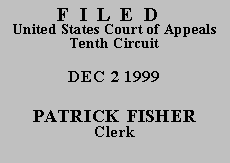

|
ROBERT E. TRACY, Acting in Behalf of Petitioner's Wife and Sons, |
|
Before TACHA, McKAY, and MURPHY, Circuit Judges.
Plaintiffs, Robert Earl Tracy, his wife, and his children (collectively "Plaintiffs"), proceeding pro se, filed a complaint on June 25, 1998 in the United States District Court for the Western District of Oklahoma. The United States and the Department of Justice were named as defendants ("Defendants"). The complaint, which is virtually incomprehensible, contains references to a plethora of constitutional provisions which Plaintiffs claim were violated by Defendants. In addition to the federal claims alluded to in the complaint, Plaintiffs also allege wrongdoing by state and local officials in the states of California, Oklahoma, Texas, and Arkansas and to wrongs purportedly committed against them by family members.
Defendants filed a Motion for More Definite Statement or, in the Alternative, Motion to Dismiss. The district court held that Plaintiffs' complaint failed to comply with the pleading requirements of Rules 8(a)(1) and 10(b) of the Federal Rules of Civil Procedure. The district court also concluded that, even if Plaintiffs were allowed to amend their complaint, they would be unable to file a short and plain statement of the grounds upon which the court's jurisdiction depends. Accordingly, the district court dismissed the complaint without prejudice.(1) Additionally, the district court enjoined Plaintiffs from filing further lawsuits in the United States District Court for the Western District of Oklahoma unless they are represented by an attorney admitted to practice before that court or unless they first obtain leave of the court. Plaintiffs appeal the district court's dismissal of their complaint.(2)
This court is required to construe all pleading filed by Plaintiffs liberally. See Haines v. Kerner, 404 U.S. 519, 520 (1972). However, Plaintiffs' appellate brief, like their complaint and other pleadings, is vague, disjointed, and replete with sentence fragments and conclusory statements. Although Plaintiffs' pleadings reference violations of several Amendments to the United States Constitution and "many more of the U.S. Codes," it is impossible to discern the exact bases of Plaintiffs' claims. Plaintiffs do not provide any coherent details of the acts underlying those violations, including the dates on which they occurred. Even construed liberally, Plaintiffs' pleadings fail to meet even the minimal requirements of the Federal Rules of Civil and Appellate Procedure.
Upon de novo review of Plaintiffs' pleadings, the district court's Order dated March 8, 1999, and the entire record on appeal, this court affirms the district court's dismissal of Plaintiffs' complaint without prejudice for substantially the reasons stated in the district court's Order.
ENTERED FOR THE COURT:
Michael R. Murphy
Circuit Judge
*. This order and judgment is not binding precedent, except under the doctrines of law of the case, res judicata and collateral estoppel. The court generally disfavors the citation of orders and judgments; nevertheless, an order and judgment may be cited under the terms and conditions of 10th Cir. R. 36.3.
1.Although Plaintiffs' complaint was dismissed without prejudice, this court has jurisdiction over this appeal pursuant to 28 U.S.C. § 1291. See Petty v. Manpower, Inc., 591 F.2d 615, 617 (10th Cir. 1979) (holding appellate court had jurisdiction when district court dismissed complaint without prejudice but it was the clear intent of the district court to dismiss not only the complaint but also the entire action as well); see also Clardy v. Levi, 545 F.2d 1241, 1242 n.2 (9th Cir. 1976) ("An order dismissing a complaint but not the action is not final and appealable under § 28 U.S.C. § 1291 (1970) unless special circumstances clearly indicate that the action could not be saved by any amendment which the plaintiff could reasonably be expected to make.").
2.Nowhere in their anfractuous appellate brief do Plaintiffs specifically challenge that portion of the district court's Order restricting them from filing further lawsuits in the United States District Court for the Western District of Oklahoma. This court will not address claims not raised on appeal. See Drake v. City of Fort Collins, 927 F.2d 1156, 1159 (10th Cir.1991) ("Despite the liberal construction afforded pro se pleadings, the court will not construct arguments or theories for the plaintiff in the absence of any discussion of those issues.").